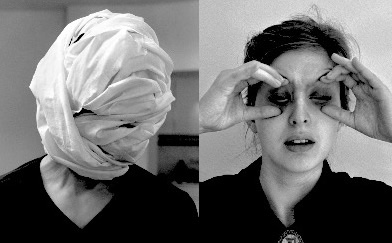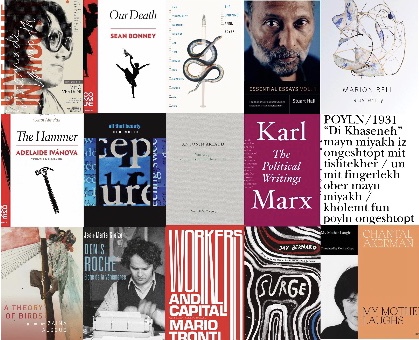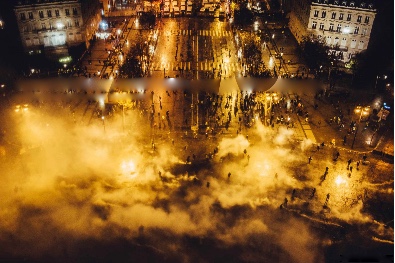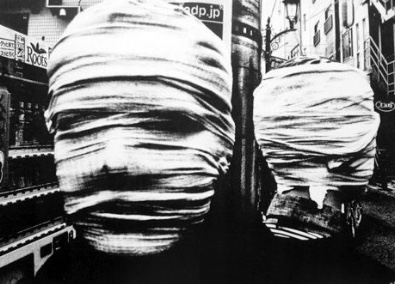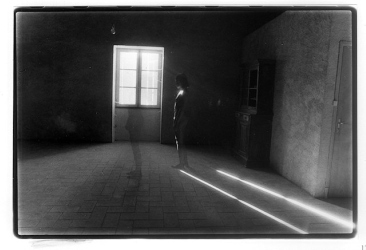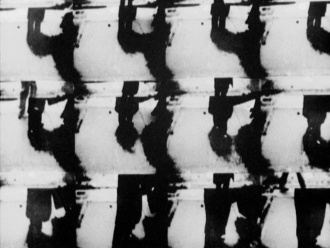Liberté. Danielle Collobert découvrant 30 ans avant Taros le concept de «pâte». // diese Aneignung [Appropriation] ist keineswegs skandalös das die «Bewegung» si // von Dichtern der negativen Moderne sich in Raquel Ateliers in Malakoff trafen // Arme an den Körper geschmiegt Wangenknochen die hervortreten Schläfen li // 947 Fotografie von Denise Colombo 43,5 x 36 cm; Sammlung André S. Labarthe
Tag: Jean-Marie Gleize
no music no poetry no prose no photographs [Danielle Collobert, Alix Cléo Roubaud, Agnès Rouzier] N°2
wenn Schreiben & Fotografie miteinander verbunden sind dann durch die Zeit // Ist Mord (Meurtre) nicht der Bericht Colloberts über den Mord an ihrer Identität // vom 26.5.1943 über die Nummerierung der Sterbeurkunden der Konzentrats // Auflösung moralischer Werte gesellschaftlicher Heuchelei Falschaussagen Sadi // ist jetzt sinnlos ihr eigener Tod naht nicht mehr mit Literatur zu tun er ist die absolute // wären Berge außer daß die Luft darüber auch schwarz ist: schwarz wie Rauch di //
Abigail Lang | The Ongoing French Reception of the Objectivists
The ties between French and American poetry are ancient and profound. In the introduction to his 1984 The Random House Book of XXth Century French Poetry, Paul Auster reminds his anglophone reader of the perennial contribution of the French language in general and French literature and poetry in particular to its British and later American counterparts, going back to John Gower and Chaucer. Focusing on the modern period, he claims that “American poetry of the past hundred years would be inconceivable without the French.” From the time of Baudelaire “modern British and American poets have continued to look to France…
Christophe Tarkos | Ma Langue est Poétique (excerpts)
Ma langue est poétique. It is poetic in its unrolling and its pieces and in the wake of its pieces, it is not composed of words attached to words by accident, by suffering, by stapling cor- ners and catch-lines and straps and frictions and stuck- together strings meticulously glued to each other to make up their length. It is not extended by a miracle in perpetual dis- equilibrium, it has breath, is a breath, is the breath, bypasses all obstacles in passing through the sublime effect, in con- tinuing on when nothing helps it continue, with a last leap….
Nathalie Wourm | Poetic Sabotage and the Control Society: Christophe Hanna, Nathalie Quintane, Jean-Marie Gleize
Parallels can be drawn between Gilles Deleuze and Félix Guattari’s concept of “minor literature” and the artistic practice of a number of contemporary French writers, whose works do not only represent the voicing of their political contentions, but also act as verbal objects designed to undermine the mainstream idea of what literature is and should be. [..] Christophe Hanna, Nathalie Quintane, and Jean-Marie Gleize are three authors who share a number of theoretical ideas and political references and have been expressing their opposition to the system in this way.
Best Books of 2019
Miyó Vestrini | Grenade in Mouth Those who write are not even of a race. Nor a caste. Nor a class. Nor are they one. They ruin the point of living, like women in a world of science. Behind thick lenses, the court is never dull. They have all privileges: from philosophy up to anger, passing through conjugal relations, and the length of the paragraphs. Between the rights of man it is figured that the writer should write largely for himself first, then for the others, with a purpose well or poorly defined: to flood the window displays,…
Jean-Marie Gleize | A Preparatory Act | Insurrection [8th December 2018: Julien Coupat preemptively arrested]
Saturday, 8 December 2018: Julien Coupat preemptively arrested a preparatory act … successive laws has constructed a system of emergency powers which renews the lois scélérates the charge of “criminal conspiracy to commit a terrorist act” it takes only two people to constitute a “terrorist group” and it takes only a preparatory act for the infraction to be so defined. This preparatory act is not specified relation—even tenuous or remote, even love or friendship—with any of the opposed to common law which criminalizes the acts, the antiterrorist approach implicated in a terrorist activity without having to establish a…
Democracy. Jean-Marie Gleize / Rimbaud / Kristin Ross
Jean-Marie Gleize Democracy There is, in Rimbaud’s Illuminations, a text called “Democracy.” We know little of this text’s composition, as the manuscript is lost. It was published belatedly in a journal (La Vogue, 1889), but we are scarcely surprised to encounter a text of this title from the quill of that democrat Rimbaud, virulently hostile to Napoléon III’s dictatorship, radically aligned with the insurrectionary movement of the Paris Commune — with, one might say, an insurgent, revolutionary democracy. As Bernard Noël has suggested, Rimbaud is a communard “not only in his opinion, but in his being.” Now the particularity…
Jean-Marie Gleize; ELEVEN NOVEMBER 2008 / ANARCHY / STATIC SHOTS / CAUGHT IN THE WATER / BEYOND VOICE
2. ELEVEN NOVEMBER 2008 That night the wind was blowing above the ferns. The sky had fallen like a metal shutter. The scene was almost invisible and mute. One could hear footsteps. * … knocking over, bit by bit, all the obstacles … making each sentence into a fire stand “the folly of an order” On eleven November at 5 a.m. the police cross Toy-Viam with dogs. The five access roads to the village of Tarnac are blocked. The village is sealed. A helicopter surveys the zone. 150 policemen 60 from the sdat (sous-direction de l’antiterrorisme) 50…
Jean-Marie Gleize | “Where do the dogs go?”
‘Où vont les chiens ? ’, ‘Where do the dogs go?’,1 this question is posed by Baudelaire in the last ‘prose’ poem (in Spleen de Paris) in order to evoke a kind of literature that would correspond with urban, modern life – a kind of poetry which is adapted to those ‘sinuous ravines’ of the cities where the ‘poor’ roaming dogs are, the famished dogs. This question is also relevant to poetry: ‘where does poetry go?’, ‘where do the poets go?’. This question has troubled me for far too many years, and this is the reason why I cannot separate my poetic…





